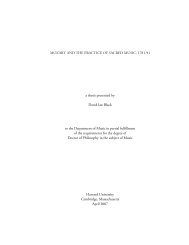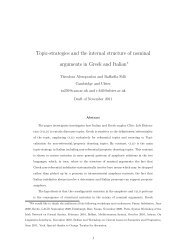Subjects, Topics and the Interpretation of Referential pro.
Subjects, Topics and the Interpretation of Referential pro.
Subjects, Topics and the Interpretation of Referential pro.
Create successful ePaper yourself
Turn your PDF publications into a flip-book with our unique Google optimized e-Paper software.
5.3 Rizzi’s (2006) Subject Criterion<br />
As we know, <strong>the</strong> Extended Projection Principle (EPP) <strong>of</strong> <strong>the</strong> GB framework expresses <strong>the</strong><br />
obligatoriness <strong>of</strong> a subject position in <strong>the</strong> sentence. Within <strong>the</strong> GB ap<strong>pro</strong>ach, <strong>the</strong> EPP position<br />
is filled after <strong>the</strong> raising <strong>of</strong> an argument from its <strong>the</strong>matic position. The EPP position is taken<br />
to be an A-position <strong>and</strong>, as such, a final target <strong>of</strong> movement. Since under Minimalist tenets<br />
move α is constrained by scope <strong>and</strong> feature-checking requirements (cf. Chomsky 2005),<br />
Nominative Case assignment is <strong>of</strong>ten <strong>of</strong>fered as morphological motivation for subject<br />
movement.<br />
However, as suggested in Rizzi (2006), at least partial dissociation between <strong>the</strong> EPP<br />
position <strong>and</strong> <strong>the</strong> Case-Agreement system should be assumed. Evidence is given by <strong>the</strong><br />
existence <strong>of</strong> quirky (non-nominative) subjects, with <strong>the</strong> preverbal subject position filled by an<br />
inherently Case-marked phrase <strong>and</strong> agreement construed with an internal argument:<br />
(33) A Gianni piacciono queste idee<br />
to Gianni please.3PL <strong>the</strong>se ideas.NOM<br />
‘Gianni likes <strong>the</strong>se ideas.’<br />
As <strong>the</strong> element satisfying <strong>the</strong> EPP <strong>and</strong> <strong>the</strong> agreement element can be dissociated, Rizzi<br />
assumes two distinct heads, each related to a distinct DP position (according to <strong>the</strong> common<br />
assumption that a head cannot carry a complex feature specification, allowing it to enter an<br />
Agree relation with one phrase <strong>and</strong> at <strong>the</strong> same time attract ano<strong>the</strong>r phrase). This distinct<br />
subject position is postulated in a different zone <strong>of</strong> <strong>the</strong> IP space, so that <strong>the</strong> following<br />
hierarchy is <strong>pro</strong>posed (cf. also Cardinaletti 2004):<br />
(34) EPP…. Agr …. DP1…. DP2<br />
Given this ‘dissociation’, Rizzi explores <strong>the</strong> possibility that <strong>the</strong> EPP position is<br />
connected with a topic-related feature. However, he rejects <strong>the</strong> possibility <strong>of</strong> a complete<br />
assimilation between subject <strong>and</strong> topics because “subjects are possible in out <strong>of</strong> <strong>the</strong> blue<br />
contexts, while CLLD objects are not”. 47 To support this claim, he <strong>pro</strong>vides examples like<br />
(35):<br />
(35) a. Cosa è successo?<br />
‘What happened?’<br />
b. Un camion ha tamponato l’autobus per Roma<br />
a truck have.3SG bump.PAST <strong>the</strong> bus for Rome<br />
‘A truck has bumped into <strong>the</strong> bus for Rome.’<br />
c. #L’ autobus per Roma, un camion lo ha tamponato<br />
<strong>the</strong> bus for Rome a truck it have.3SG bump.PAST<br />
‘(as for) <strong>the</strong> bus for Rome, a truck has bumped into it.’<br />
Rizzi thus concludes that <strong>the</strong> EPP is a manifestation <strong>of</strong> a Subject Criterion: “<strong>Subjects</strong> occur in<br />
<strong>the</strong> higher part <strong>of</strong> <strong>the</strong> inflectional field, higher than Agr, or whatever head carries <strong>the</strong><br />
agreement features if independent agreement heads do not exist” (Rizzi 2006, p. 120).<br />
I suggest that Rizzi’s sentences in (35b-c) do not <strong>pro</strong>ve a ‘dissociation’ between <strong>Topics</strong><br />
<strong>and</strong> <strong>the</strong> EPP feature but, ra<strong>the</strong>r, that a weak <strong>pro</strong>noun in subject position is <strong>the</strong> best syntactic<br />
47 Rizzi (2006) argues that what makes a difference between subject <strong>and</strong> topic is <strong>the</strong> <strong>pro</strong>perty <strong>of</strong> being D-linked<br />
(cf. note 15), since “topics are always D-linked, while subjects not necessarily”. As already discussed in sections<br />
3.1-3.2, D-linking is not a <strong>pro</strong>perty <strong>of</strong> all types <strong>of</strong> Topic <strong>and</strong>, in particular, not a <strong>pro</strong>perty <strong>of</strong> <strong>the</strong> Aboutness-shift<br />
Topic.<br />
25
















